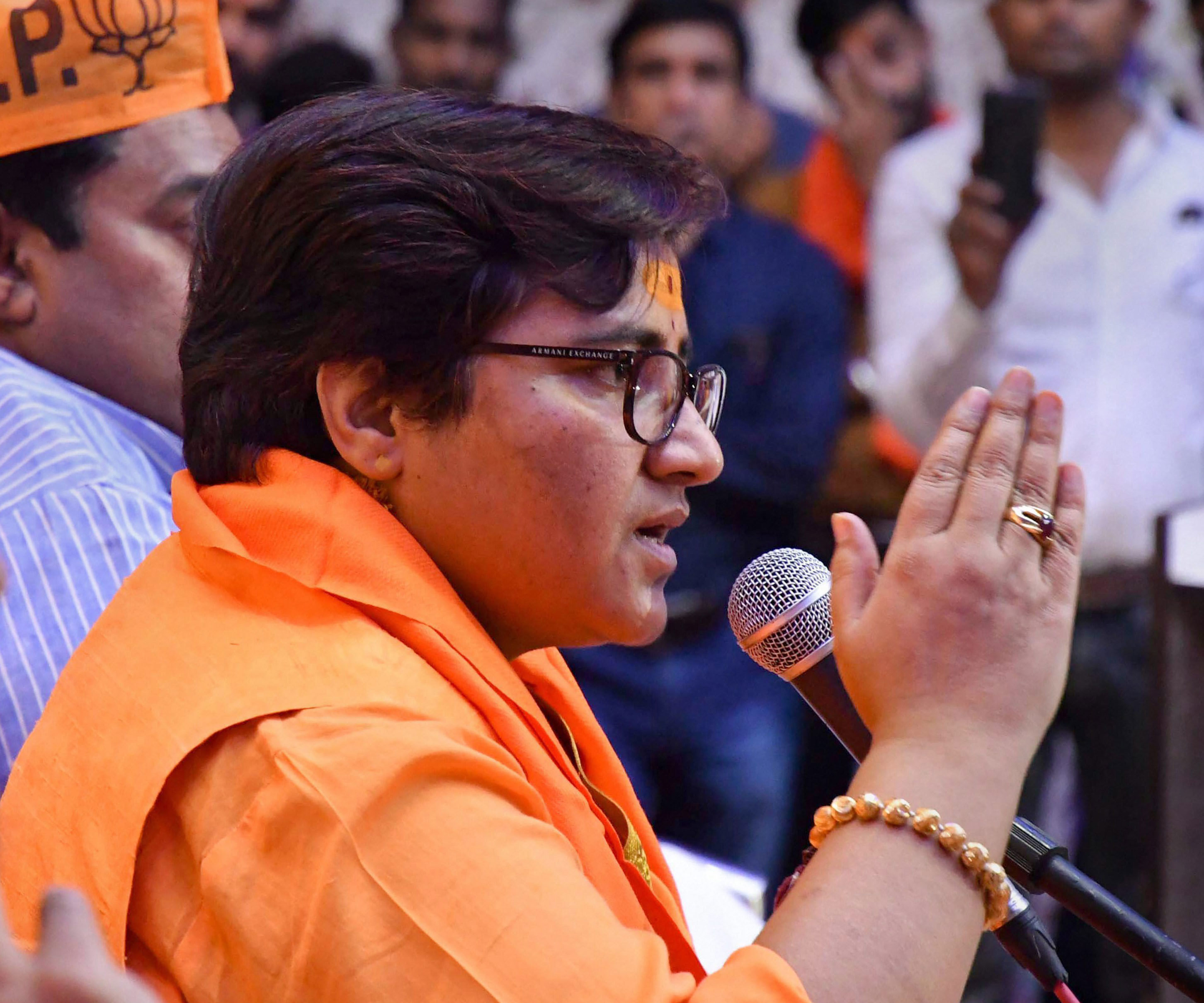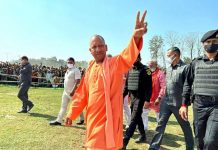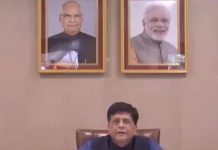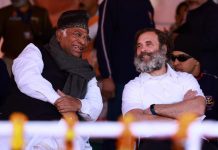
While Sadhvi Pragya tore into Hindi film industry over besharam rang song, a headmaster in Pilibhit in UP got into trouble with the VHP for asking children to recite a poem penned by poet Iqbal. Where are we headed?
“Kick them in the stomach, destroy their businesses and never watch any of their films” : the latest from Sadhvi Pragya as she lashed out at the Hindi film industry and its self-styled Kings .
But when it comes to Sadhvi Pragya, it is always a no-holds barred situation.
Remember her asking Hindus to keep knives sharpened at homes ready to use them against those who attacked them? Read Muslims or as she said “those who do love jihad”.
Sadhvi Pragya, as Pragya Singh Thakur is better known, is a BJP MP who has a penchant for controversy. Therefore when she jumped into besharam rang, a shameless colour one, with her kick them in the stomach remark, it fit in.
Gerua or the saffron colour is synonymous with the BJP.
Finding its roots in religion, the saffron flag adorns many Hindu temples across India. The Rashtriya Swayamsevak Sangh, the parent organisation of the BJP, embraced it as its own calling it the bhagwa dhwaj or the saffron flag.
Even though religion has no colour, saffron willy-nilly came to be associated with sanctity and in turn Hinduism. Conservative households, till date, considered it auspicious. Huge idols of God Hanuman, for instance, are painted saffron.
Politically, colours play a huge role and are deftly used for electoral gain, particularly with the BJP gaining a foothold.
The saffron Party, as the ruling Bharatiya Party is commonly known, has exploited this symbolism to the hilt.
Apart from flagging its religious connotation, the BJP has associated bhagwa with nationalism and in one stroke made Hinduism and nationalism synonymous if not interchangeable.
However, till BJP’s saffron drive, red was associated with the Left parties, it being the colour of revolution.
Again, when Mayawati steered the Bahujan Samaj Party to power in Uttar Pradesh, she painted the state blue at least notionally. Even the grey elephant, her election symbol, were washed in a blue hue.
The Samajwadi Party, again a regional outfit like Mayawati’s BSP, uses green as its colour.
But green has wider ramifications and that too religious, given that it is the colour of Islam and in that sense one that the Muslims rightfully claim as their own.
On a larger scale, the conflict is between the saffron and the green or as hardliners would say: Hindus versus Muslims.
Traditionally at loggerheads, the divide has sharpened since the BJP’s ascent to power. It is this divide the BJP, Pragya Thakur, included, is exploiting for political gain.
In the eye of a storm is Bollywood and its interpretation of the saffron colour.
The current controversy relates to a song from a Shah Rukh-Deepika Padukone starrer Pathan.
Padukone, allegedly clad in a saffron-coloured bikini, is dancing to the song Besharam rang, which the BJP chooses to interpret as being derogatory.
Literally translated, Besharam Rang means shameless colour. The BJP’s nuance: saffron is being degraded and decried as a shameless colour by Bollywood.
However, what BJP wilfully chose to ignore is that the colour is not the focus of the song given that it is one of the many bikinis Padukone adorns in different colours of which saffron, rather orange, just happens to be one. Hence its rant about saffron being a shameless colour is unfounded.
Had the BJP not raised the colour controversy, the saffron rather orange bikini would have escaped attention. Or the bhagwa ka apmaan, insult to saffron, spiel: “Bhagwa rang pehan kar badan ki numaish”.
However one must concede that there is substance to the badan ki numaish: exhibiting one’s body, bit.
Politics apart, the number that is being traded off as scintillating is plain vulgar to say the least. And for an artist of Padukone’s calibre to go for moves as she has in the song does display artistic bankruptcy. And about the so-called King Khan, the less said the better.
But then to expect the BJP to be rational is asking for the moon.
Panning out alongside is yet another set of lyrics and herein it is neither about colour nor verse: it is about the poet himself and worse still, his being a Muslim to put it bluntly. Enough ground for the BJP to rake up an issue.
This time around it was no one as glamorous as Padukone nor as reigning as Khan but a nondescript headmaster of a school in Pilibhit in the state of Uttar Pradesh.
Taking up cudgels against him was a Hindu right wing Vishwa Hindu Parishad leader.
His grouse: the headmaster asked the children to recite a poem penned by poet Mohammad Iqbal instead of the national anthem in the morning assembly.
Following the complaint, the headmaster was suspended.
His plea that the poem, Lab pe aati hai dua, was part of the Urdu syllabus and had been recited in the past, cut no ice. Or the fact that the practice of kids singing Lab pe aati hai dua, and Itni shakti hamen de na data along with the national anthem has been in place since 2011.
It is pertinent to point out that in the government school in question, majorly has Muslim students on its roll.
What is glaring is that the VHP protagonist termed the poem as a “madrassa prayer”, one that is recited in religious schools run by Muslims.
In the process, the fanatics forgot that verse knows no religion and cuts across narrow boundaries.
Muhammad Iqbal, better known as Allama Iqbal, is one such poet who penned “Sare Jahan se achcha hindustan hamara… hindi hain hum…”
And how can one overlook the fact that it was Iqbal who translated the Gayatri Mantra from Sanskrit to Urdu? Or the fact that he was of Hindu lineage, his grandfather being a Kashmiri Pandit?
Having said that one cannot ignore the criticism that Iqbal propagated the two-nation theory and also wrote Tarana-o-Milli some six years later where instead of Hindi hai hum it was Muslim hai hum…
And it is at this point that several questions come up.
Should writers, poets and thinkers subscribe to only one point of view? Don’t they have a right to look at the other? Will India now subscribe to only those who think Hindustan and reject those who have a worldview?
Iqbal sure propagated the creation of Pakistan but isn’t he well within his rights to articulate what he thinks is in the “best interests of the Muslims of India and Islam”, as he said at the Muslim League’s annual session? Or change his mind about a view he may have held in the past?
Going by the RSS-VHP-BJP conglomerate, he or anyone else does not have that right.
Ostensibly, the objection and subsequent suspension of the headmaster was because the national anthem was replaced but the real reason lies somewhere else: that perhaps being that Allama Iqbal took precedence; the school has a substantial Muslim presence and more so the headmaster is a Muslim. So it seems to be solely a target Muslims agenda playing out.
Irrespective, the questions that stare hard in our face are: Where are we headed? Will this end or will the situation worsen by the minute even as the BJP continues increasing its number-tally?
If Allama Iqbal is being held for advocating an Islamic state then how does one absolve those who are converting India into a Hindu monolith bit by bit and brick by brick?
The answers are there for everyone to see, the writing on the wall clear except those who wish not to see or read will always rake up frivolous issues of colour and verse













